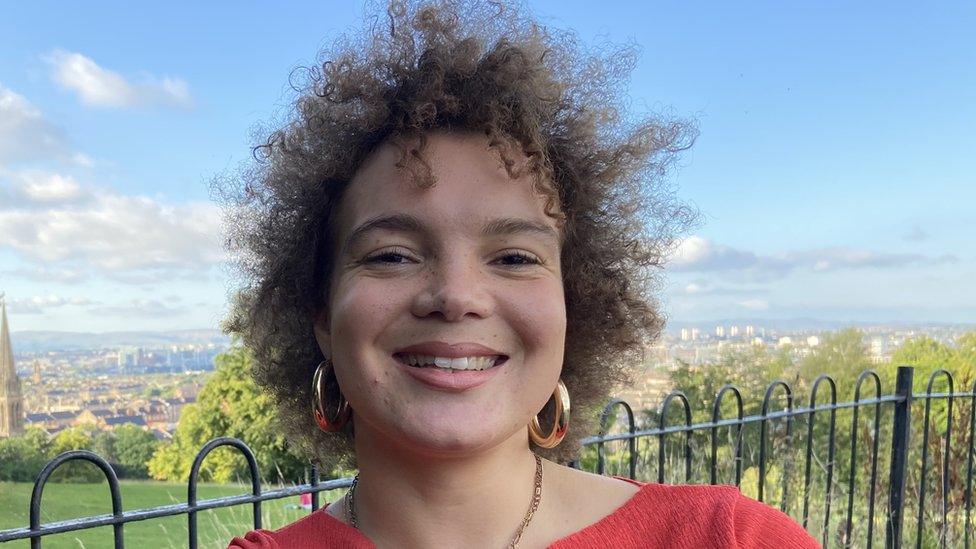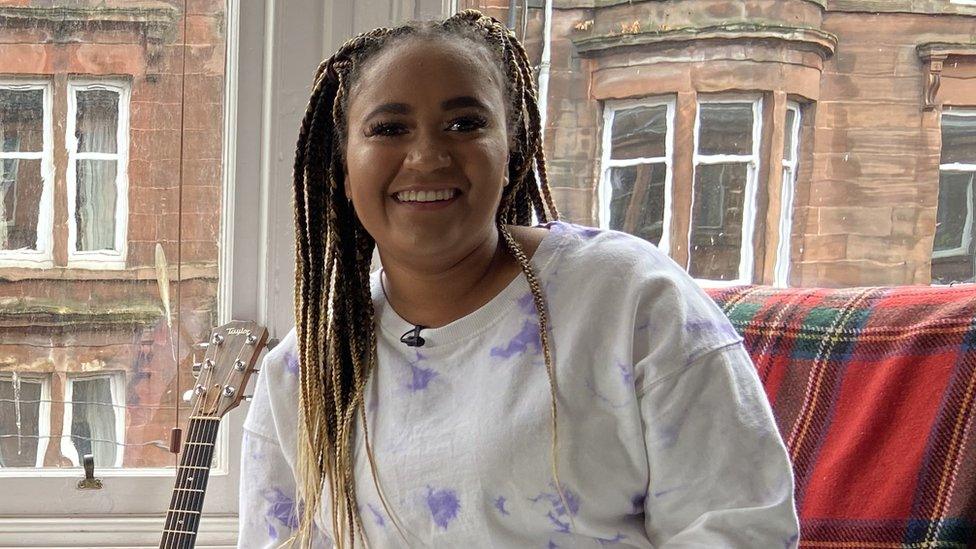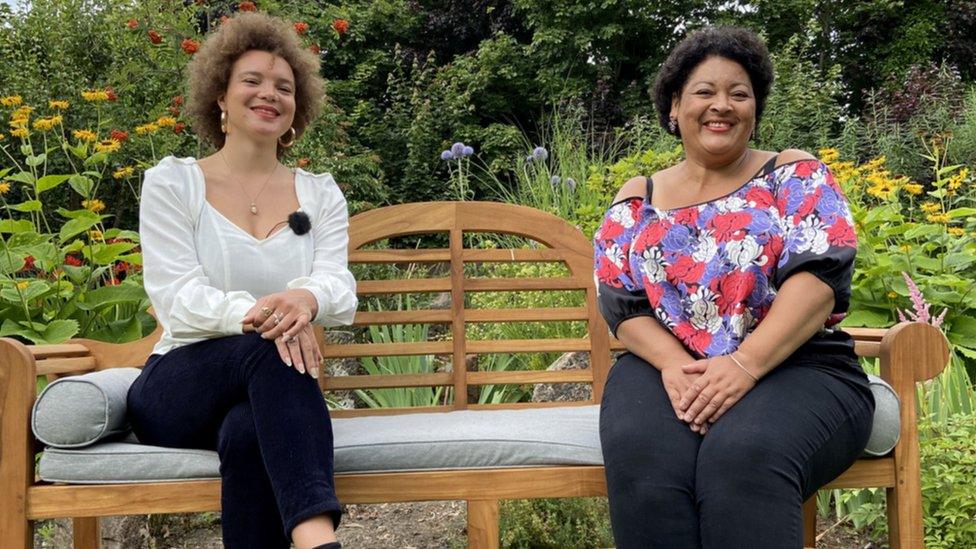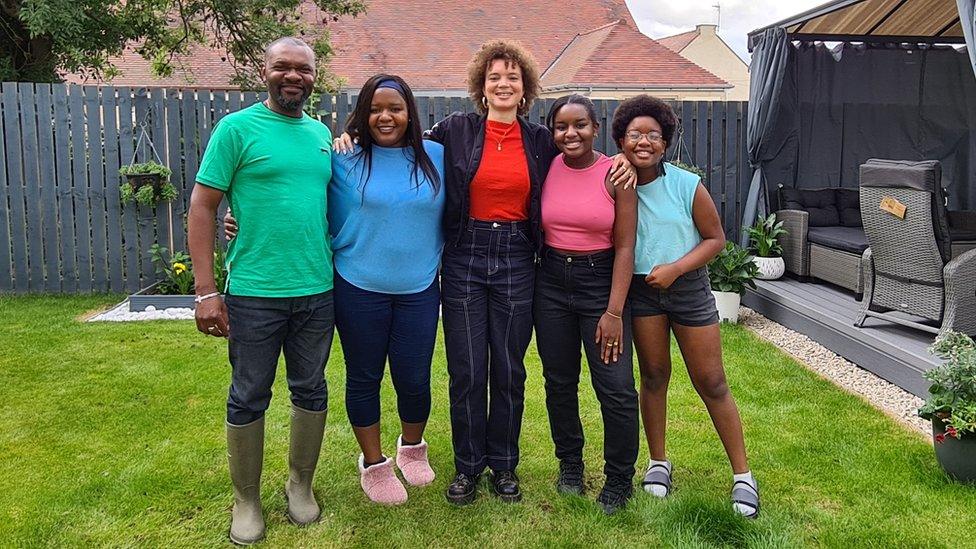'Some people find it very unusual that I speak Gaelic'
- Published

Cass Ezeji says felt "lost" at Gaelic school but has since gained an appreciation of her education
Gaelic speakers of African and Caribbean descent have shared their experiences of the language in a new BBC Alba documentary.
Glaswegian student and musician Cass Ezeji says some people she meets think it is unusual she is fluent in Gaelic and also has African heritage. Her paternal grandfather is Nigerian.
Growing up, Cass went to the Glasgow Gaelic School, Sgoil Ghàidhlig Ghlaschu, which teaches at both primary and secondary school levels.
Cass' parents, who do not speak Gaelic, chose the school because they thought she would get a good education there.
But Cass says she felt "a little lost" in immersive Gaelic-medium education, and among peers whose families were from the Highlands and Islands - the Western Isles are Gaelic's "heartland".
'There was a disconnect'
She says she argued with her mum about having to go to the school, and even felt angry about it.
The 27-year-old says: "The impression I had when I left school was that I didn't feel part of the Gaelic world.
"I didn't see myself represented in the culture so there was something of a disconnect."
But she says she has since gained an appreciation of her education and describes herself as an Afro-Gael.
Through making the documentary, which also examines racism and Scotland's historical links with the slave trade, Cass met other women of African and Caribbean descent who are also Gaelic speakers.

Amina Davidson says she loves being part of Scotland's traditional music scene
They include Amina Davidson, a traditional musician who lives in the Partick area of Glasgow.
During the first lockdown last year, she joined her neighbour Robert Robertson - singer with the Scottish band Tide Lines - in singing the Gaelic song Teann a-Nall from the windows of their tenements to entertain other residents. A video of the performance on social media went viral.
"It now has 1.5 million views," says Amina.
The singer says she enjoys being part of the traditional Scottish and Gaelic music scene, adding: "It's a small, friendly world which I enjoy.
"Everyone knows one another and there are lots of traditional musicians in this area where I live."

Carrie Prescott says people sometimes find it unusual that she speaks Gaelic
Carrie Prescott, of Wishaw, North Lanarkshire, started learning Gaelic as an adult as part of a degree and is actively involved in the language and culture.
She says: "Sometimes when I'm at Gaelic events, or I'm speaking to somebody, and it transpires that I speak Gaelic they find it very unusual.
"They're not expecting us to be able to speak Gaelic."
Tawana Maramba, of Tranent, East Lothian, is a student and Gaelic singer.
Her parents are from Zimbabwe and they raised her to speak their Shona language, but also encouraged her interest in other languages and placed her in a Gaelic-medium education primary school.

Cass and Tawana Maramba, second right, and the Maramba family
She says: "In high school the only Gaelic-medium subject was Gaelic language, but in primary school every subject was in Gaelic.
"That was so good in primary school because it meant that we spoke Gaelic every day."
Tawana now teaches Gaelic singing and participates at the Royal National Mod, an annual celebration of the language and culture.
Last year, she appeared in a Gaelic short film about Eliza Junor, a girl from Guyana and the descendant of slaves who grew up in Fortrose in the Highlands in the early 19th Century.
Tawana says: "I feel some people react like: 'Oh you speak Gaelic?'
"But I'm quite proud of that. It plays a huge part in my life."
The documentary, Trusadh: Afro-Gàidheil - Afro-Gaels, will be shown on BBC Alba on Monday at 21:00 and will later be available on iPlayer.